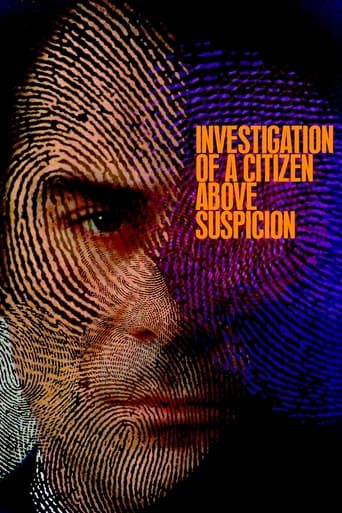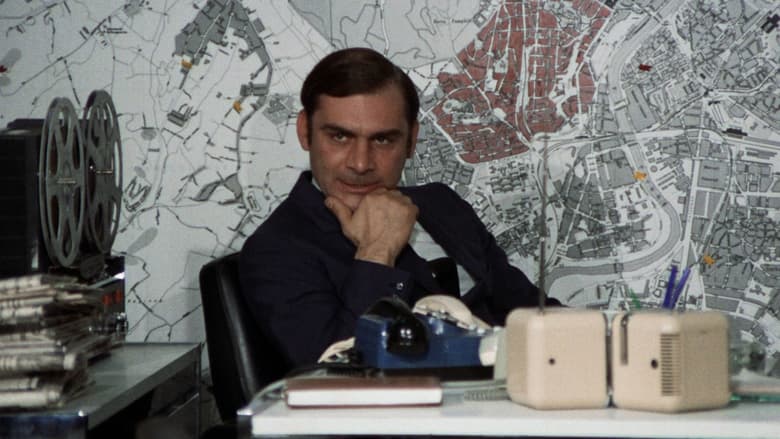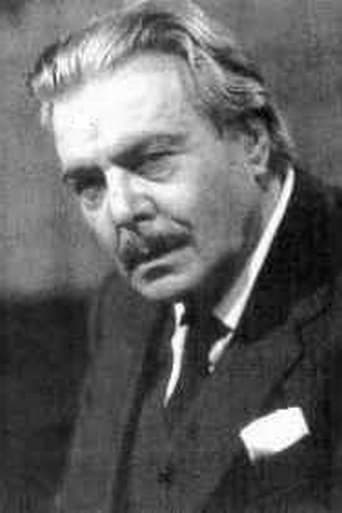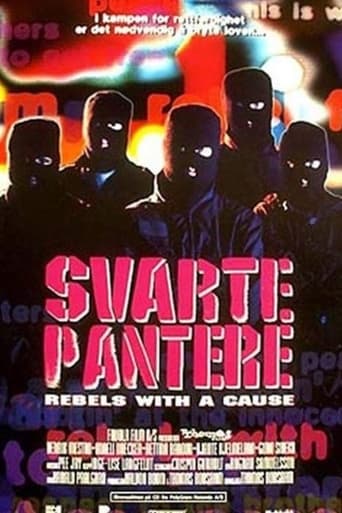

Investigation of a Citizen Above Suspicion (1970)
Rome, Italy. After committing a heinous crime, a senior police officer exposes evidence incriminating him because his moral commitment prevents him from circumventing the law and the social order it protects.
Watch Trailer
Cast


Similar titles
Reviews
When people ask me why I'm so fanatic about Italian cinema, I always refer to the beautiful Gothic horrors of Mario Bava, the outrageous splatter flicks of Lucio Fulci, the virulent Poliziotesschi thrillers of Umberto Lenzi or the stylish Gialli of Dario Argento. Quite often, however, this still isn't sufficient to persuade them of the fact that Italy is the best film-producing country in history. Perhaps if I refer more directly to the political drama/thrillers of Eli Petri, and particularly "Investigation of a Citizen above Suspicion", they will finally understand "Investigation of a Citizen above Suspicion" won the Academy Award for best foreign language film in 1971, but according to the data here on this website the film received another nomination in 1972 in the category "best original screenplay". I don't know how it's possible for the same film to get nominated in two different years, but I can state that winning a prize for the screenplay is even more justified and deserved than winning for the overall best film. The story and screenplay are definitely the most brilliant aspects of this movie. The basic story idea is perhaps even the most purely genius one that I have ever encountered; and I think I've seen more than 5.000 films The plot is about a police detective, formerly homicide department but now promoted to political supervision squad, who kills his mistress in cold blood and deliberately leaves all sorts of clues (fingerprints, footprints, clothing fibers ) behind in the apartment that unmistakably lead to him as the culprit. Why? Because he's convinced that he will get away with this murder and never get arrested regardless of how obviously all the evidence points towards him. And why is that? Because, apart from being the most arrogant and obnoxious person in the world, 'Il Dottore' is also a very prominent, powerful and influential member of the community. And the corrupt Italian political system simply doesn't allow for respectable citizens like him to be accused of filthy crimes such as murder. Perhaps it's just me, but I still get blown away myself every time I mention this plot concept to anyone! It's such a clever, courageous and 200% unconventional subject, and the incredibly gifted Elio Petri processed it into a harsh but unforgettable and intelligent thriller/satire. The film ends with a quote of Franz Kafka that sums up the whole thing quite neatly, but most viewers will already have made the comparison with Kafka earlier during the film as well. "Investigation of a Citizen above Suspicion" certainly has a couple of defaults, but other and more essential aspects are impeccably brilliant. Notably the screenplay, as mentioned already, but surely also the unique performance of Gian Maria Volontè as "Il Dottore". Volontè depicts what is arguably the most loathsome and disturbing protagonist in cinematic history, and that includes serial killers, mass murderers and 10ft tall alien monsters! His arrogance and menace is unequaled and for that alone Volontè also should have received an Oscar. Florinda Bolkan as the victim, primarily appearing in flashback sequences, is terrific as well. She's sensual, playfully provocative and – in her own self- destructive fashion – even more powerful than "Il Dottore". Last but not least, there's another truly masterful score by Ennio Morricone. If the music initially seems goofy or misfit to the tone of the film, just bear with it and I guarantee that you'll be hooked on it forever after.
There is an epilogue, appropriately enough from Kafka, because this is the story of a bureaucrat who is highly placed in the police hierarchy and can't seem to convince anyone that he's committed the murder of a whore he was having a relationship with. And in the end the family nonchalantly sweeps out the dead bug.Gian Maria Volonte is the recently promoted head of the homicide squad. At first I thought his performance was stereotypical. He struts around with a smirk, shouts orders, demands that the espresso coffee machine be removed, pursues and uses enhanced interrogation on demonstrators, communists, socialists, homosexuals, and kids with long hair. (This is 1970.) The hooker he's boffing turns out to be a police buff and loves to be "interrogated" harshly by Volonte. He makes her kneel, slaps her about, and talks her into revealing her most shameful secrets.But then, whimsically, she throws him over for someone else, claiming that he's not manly enough for her, that he's a baby who probably still wets the bed -- so he cuts her throat. He deliberately leaves clues to his identity all over the crime scene.So far, so routine. He's so ridden with guilt over his actions that he wants to be caught. In addition he's a stern representative of oppressive power hectoring the young. We've seen this before.But at about the half way mark things begin to get a little screwy. His colleagues believe that since he is a man of such prestige and power, all the clues must be coincidental and misleading, even the most obvious. When his prints are found on a liqueur glass, a subordinate "remembers" Volante taking a drink to calm his nerves. For what it's worth, this is called "normalization" in sociology, a process in which incidents that don't quite fit the expected narrative are reinterpreted in such a way that they do.As the story progresses Volonte's efforts to inculpate himself become more frenzied. He dismisses others who might be obvious suspects. He reveals himself as the murderer to a frightened plumber. Nothing works.By the end, he's confessed openly to his superiors and then gone home to await arrest. A dozen big wigs arrive and tear up the evidence, claiming that he must be neurotic because he's worked too hard. That scene seems to have taken place only in Volonte's imagination because eventually the same big wigs really DO arrive -- or seem to -- and he joins them in the lobby, presses a button, and an elevator we never knew was there begins to lift them all silently to an upper story. It's a surreal departure from the relatively realistic plot that we've been following.I found it a little annoying at times. I understand Volonte's role calls for bombast but, Cripes, what a lot of close ups of shouting faces. Everybody shouts at everybody else. Everybody walks quickly. It's exhausting to watch and listen to, except that Ennio Morricone's musical score is both subtle and apt. The first two thirds would have made a good B feature in Hollywood back in the 40s. That last third -- well, make of it what you will.
Italian cinema has followed a long tradition of making of political cinema.The idea is to highlight strengths and weaknesses of Italian political system.Apart from famous Italian conscience keeper Francesco Rosi,Elio Petri has also made excellent films which have depicted political unrest faced by post war Italian nation.Investigation of a Citizen Above Suspicion is a frank yet bleak portrayal of a corrupt, fraudulent Italian society which is heavily dependent on its crooked police force.After watching this film,one can easily state that all corrupt societies are hindrance to human progress.Italian police is one of the most corrupt police forces in the world.This has been proved in this film by showing a perverted soul for whom power and sexuality go hand in hand.Gian Maria Volonté is excellent as an honorable police officer,citizen who is above all kinds of suspicions.This film is similar to Kitano Takeshi's masterpiece "Violent Cop".Both films show that even when a criminal is caught,crime fails to stop as the dirty political system is allowed to grow at the expense of common man.
(Includes spoilers) Elio Petri made many trenchant political and social satires. Among the best of these were "We Still Kill the Old Way," about a professor who fruitlessly and fatally takes on the Mafia; "The Working Class Goes to Heaven," about the dehumanizing impact of factory life on the individual; and "Todo Modo," a brutal attack on the Christian-Democratic rule of post-war Italy. Petri was a member of the Italian Communist Party.In "Investigation of a Citizen Above Suspicion" he dissects corruption at different levels of Italian society. His main character is a police inspector who kills his mistress while they have sex. She acts out fantasies for him of famous crimes. "How will you kill me this time?" she asks. "I'll cut your throat," he says. A few minutes later he slices her throat with a razor.She had taunted him for his sexual inadequacy, a condition which unnerves him, but what motivates him to commit the murder is the sense that as new head of political intelligence (coming from the homicide division) he can feel confident in being "above suspicion." He places deliberate and obvious clues everywhere. While holding himself above the law, however, he wants to test its effectiveness and actively takes part in the investigation.At first the police focus on the dead woman's homosexual husband and then on an anarchist student with whom she is having an affair. The inspector comes to realize that the conviction of an innocent man will not guarantee his own immunity from the law. So he must concoct a test, which if his superiors deny it, will be the ultimate test of his power. "Investigation" is really a portrait of deranged right-wing fascistic power, with its easy enemies of gays and leftists.Appearing almost completely unemotional beneath an often stormy exterior, Gian Maria Volonte' gives a stunning portrayal of a complex paranoid character entirely dedicated to upholding the law. Yet he is brazenly willing to use his authority for his own ends, logic be damned.This film caused a furor in Italy because of its unflattering portrayal of the police. Its real strength lies in is psychological insight into the deranged quest for power: personal, sexual, political. The movie won the Academy Award for best foreign film in 1970.














